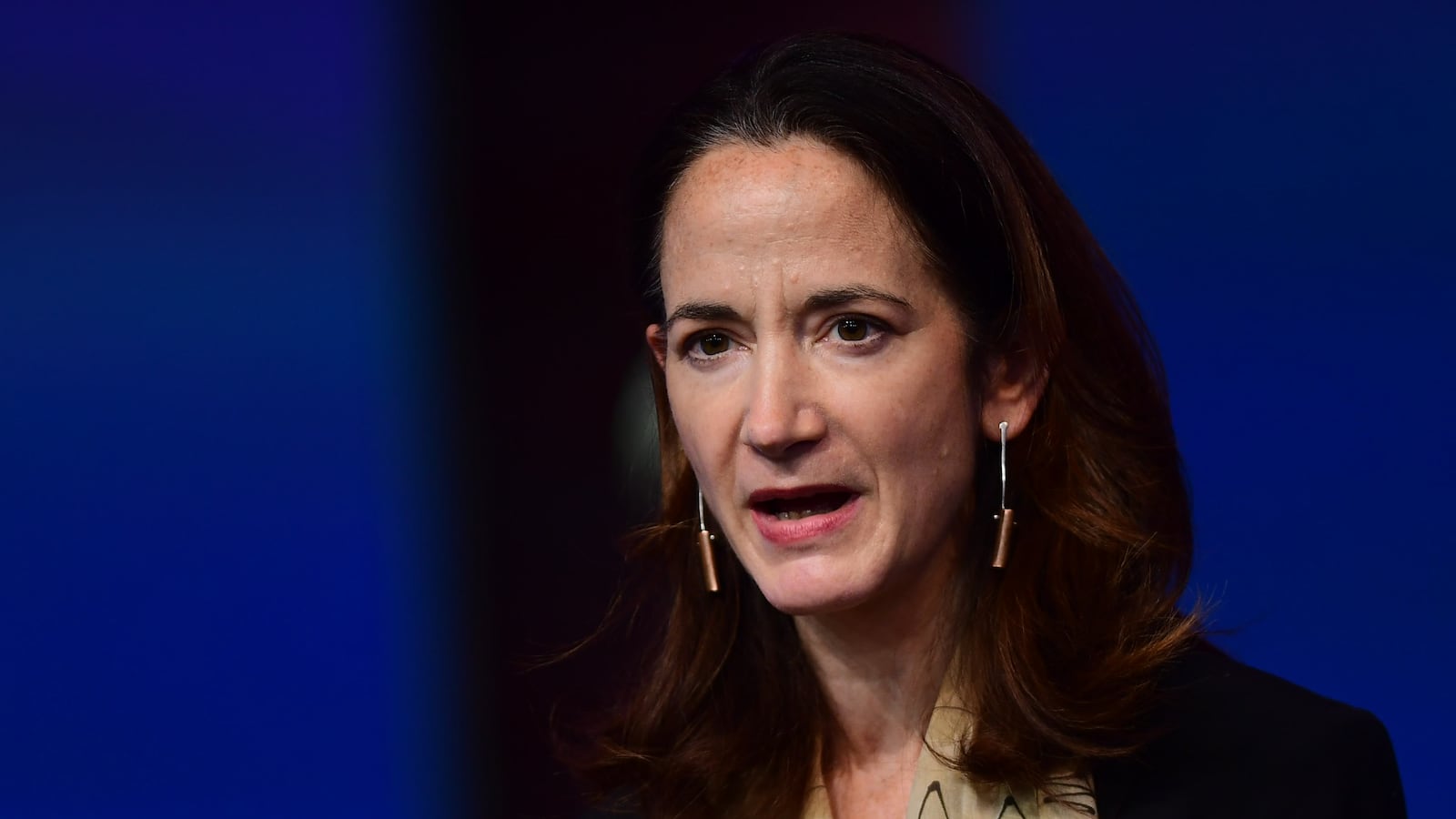President-elect Joe Biden’s nominee to run the 18 U.S. intelligence agencies anticipates producing a public assessment of the threat from QAnon, she testified at her confirmation hearing on Tuesday.
Avril Haines, whom Biden tapped as the next director of national intelligence, told Sen. Martin Heinrich (D-NM) that she would provide him with such an assessment, which Heinrich requested last month in a letter.
“I’ve seen that letter and absolutely, if confirmed, I would work with the FBI and DHS to get an answer to that question,” said Haines.
In one of the indications of how the Jan. 6 insurrection is shaping the context of Biden’s impending presidency, Haines seemed to reject putting the intelligence agencies in the lead on “an issue such as solely domestic terrorism.” She instead told the Senate intelligence committee that she wanted to provide “critical support” to the FBI and Department of Homeland Security, which will play that leading role. But she did not specify what such support would precisely be.
Instead, Haines indicated she views the intelligence agency’s work with regard to far-right terror—Haines used the phrase “white nationalism”—as a matter of identifying connections to foreign actors and disinformation. The coalescing of globalizing white nationalist and far-right violence is increasingly a focus of the incoming Biden team. Russ Travers, a former acting director of the National Counterterrorism Center who was recently tapped as Biden’s deputy homeland-security adviser at the White House, has written that the U.S. is increasingly an exporter of such violence and drew connections to the 2019 mosque murders in Christchurch, New Zealand.
But an intelligence focus on QAnon will inevitably stoke controversy. Even after the FBI warned in 2019 that QAnon posed a domestic-terror threat, at least two QAnon boosters, Marjorie Taylor Greene (R-GA) and Lauren Boebert (R-CO), have been elected to Congress. Efforts a decade ago to study far-right terror resulted in the Obama administration ending a DHS analytic entity that did so following a conservative outcry.
Speaking to the veteran presence at the Capitol insurrection, Biden’s nominee for secretary of defense, Lloyd Austin, pledged on Tuesday to “rid our ranks of racists and extremists” at his own confirmation hearing.
Notably, Haines did not during testimony request any additional authorities for the intelligence agencies with regard to right-wing extremism, an effort that has some support from liberals.
While Haines testified, Biden’s nominee to run the Department of Homeland Security, Alejandro Mayorkas, told a different Senate panel that he intends to use the secretary’s current powers against white supremacist terrorism. Mayorkas said he will look toward “empowering” DHS’ intelligence branch “in an apolitical, nonpartisan way” to “tackle the threat that domestic extremism is today.”
Mayorkas noted that as a federal prosecutor in California he created “for the first time in the office’s history a civil rights section to focus on the prosecution of hate crimes which was a growing problem back in the late '90s.”
Haines, a former deputy CIA director during the Obama administration, will run the intelligence community for Biden, which is not always a set task, given the influence of the CIA. In 2017, the Senate panel heard confirmation testimony from President Trump’s first CIA director, Secretary of State Mike Pompeo, more than a month before his first director of national intelligence, Dan Coats. Coats, a former Republican senator on the committee, showed up at Haines’ hearing to advocate for her confirmation.
Haines emphasized that one of her priorities as director will be on restoring trust in the intelligence agencies from the American people—a tall order considering the depth of persistent distrust, one reflected in the rise of the QAnon conspiracy theory, which holds that Trump is at war with a “Deep State” of security officials whom he had secretly indicted and intended to send to the still-open detention facility at Guantanamo Bay.
“The director of national intelligence must uphold our democratic values and ensure the work of the intelligence community, which is mostly done in secret, is ethical, wise, lawful, and effective,” she said.
Since its launch in Oct. 2017 with a series of anonymous internet posts, QAnon has been tied to a number of crimes, including three murders and a terrorist incident near the Hoover Dam. Prosecutors have charged several QAnon believers in connection with the Capitol riot, including the “Q Shaman,” a man dressed in horns and furs who allegedly left a threatening note in the Senate for Vice President Mike Pence.
Austin, a recently retired four-star Army general who would be the first Black secretary of defense, recalled for the Senate Armed Services Committee being a lieutenant colonel when the 82nd Airborne in the '90s “discovered extremist elements in our ranks.” Three white privates in the division conspired to shoot dead a Black couple, Jackie Burden and Michael James, near Fort Bragg. Investigations later determined nearly two dozen white supremacists in the 82nd Airborne. Austin said the division had not known what to look for despite “the signs of that activity [being] here all along.”
His comments came as the Pentagon confirmed that two of the 25,000 National Guardsmen deployed to protect the inauguration from a far-right terror attack had been sent home after texting or posting “inappropriate” comments that the Pentagon did not further describe. The department that Austin will lead—should he first receive a congressional waiver given his legally insufficient time out of uniform to serve as secretary—acknowledged last week that white supremacist and far-right extremist views have gained more adherents within the military over the past year.
“We can never take our hands off the wheel on this,” Austin said.
—Sam Brodey and Jackie Kucinich provided reporting.






